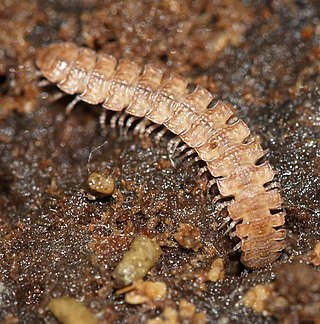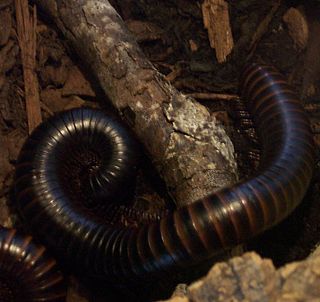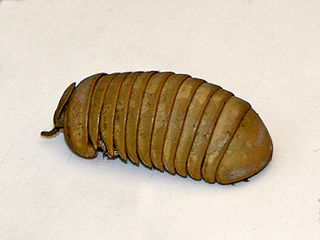
Chilognatha is a subclass of the class Diplopoda, which includes the vast majority of extant millipedes, about 12,000 species.

Lithobius is a large genus of centipedes in the family Lithobiidae, commonly called stone centipedes, common centipedes or brown centipedes.

Cormocephalus is a genus of centipedes of the family Scolopendridae, containing the following species:

Carl August Graf Attems-Petzenstein was an Austrian myriapodologist and invertebrate zoologist. He published 138 scientific papers, most of them dealing with his specialist field, the myriapods. He described about 1800 new species and subspecies from all over the world.

Archispirostreptus is a genus of giant African millipedes in family Spirostreptidae, containing 26 species:

Spirostreptus is a genus of giant millipedes of the family Spirostreptidae. It contains the following species:

Orthoporus is a genus of spirostreptid millipedes, containing around 80 species, distributed from the southern United States to Brazil and Argentina.

Julidae is a family of millipedes in the order Julida, containing more than 600 species in around 20 genera. Its members are largely confined to the Western Palaearctic, with only a few species extending into the Oriental and Afrotropical realms. They are united by a characteristic form of the mouthparts, and are classified in the superfamily Juloidea of the order Julida, alongside the families Trichoblaniulidae, Rhopaloiulidae and Trichonemasomatidae.

Zephroniidae is a family of giant pill millipedes in the taxonomic order Sphaerotheriida. They occur in southeast Asia from the Himalayas and China south and east to Sulawesi and to Australia, and also inhabit some Philippine islands.

Julus is a genus of millipedes in the family Julidae, containing the following species:

Orthomorpha is a genus of millipedes in the family Paradoxosomatidae containing approximately 50 species distributed in Southeast Asia.

Zephronia is a genus of giant pill millipedes in the family Zephroniidae. This genus includes 47 species distributed throughout N. India, Myanmar, Thailand, Malayan Peninsula, Java, Sumatra and Borneo.

Geophilus is a large, heterogeneous genus of soil centipedes in the family Geophilidae largely considered to be synonymous with Brachygeophilus. This genus is mostly Holarctic and characterized by a claw-shaped ultimate pretarsus, complete or nearly complete coxo-pleural sutures at the prosternum, and incomplete chitin-lines. Centipedes in this genus feature slightly elongate heads and labral intermediate parts with tubercles, the forcipules are usually poorly elongate with a single small tubercle at the base of each tarsungulum, and the anterior trunk metasternites usually have an anterior medial socket and a posterior transversally elongate pore-field. The generic name first appeared in Brewster's Edinburgh Encyclopaedia in 1814 as Geophilus electricus.

Anoplodesmus is a genus of millipedes. It is one of the most species rich genera in the family Paradoxosomatidae, with over 40 described species distributed from India and Nepal to China and Southeast Asia, as well as the Mascarene Islands and Fiji.

Thyropygus is a genus of millipedes in the family Harpagophoridae, widely distributed throughout Southeast Asia. It is the most-species rich genus of Harpagophoridae in Southeast Asia. Over 30 species occur in Thailand.

Trigoniulus is a genus of millipede in the family Trigoniulidae. There are at least 90 described species in Trigoniulus.
Siphonophora is a genus of millipedes belonging to the family Siphonophoridae.

Cryptops sometimes known as cave centipedes, is a centipede genus in the family Cryptopidae; species records have a world-wide distribution.

Otostigmus is a genus of centipedes in the family Scolopendridae. It was first described by Swedish naturalist Carl Oscar von Porat in 1876. The genus as a whole comprises around 157 species, found primarily in the Neotropics.

Australobius is a genus of centipedes in the family Lithobiidae. It was described by American biologist Ralph Vary Chamberlin in 1920.


















